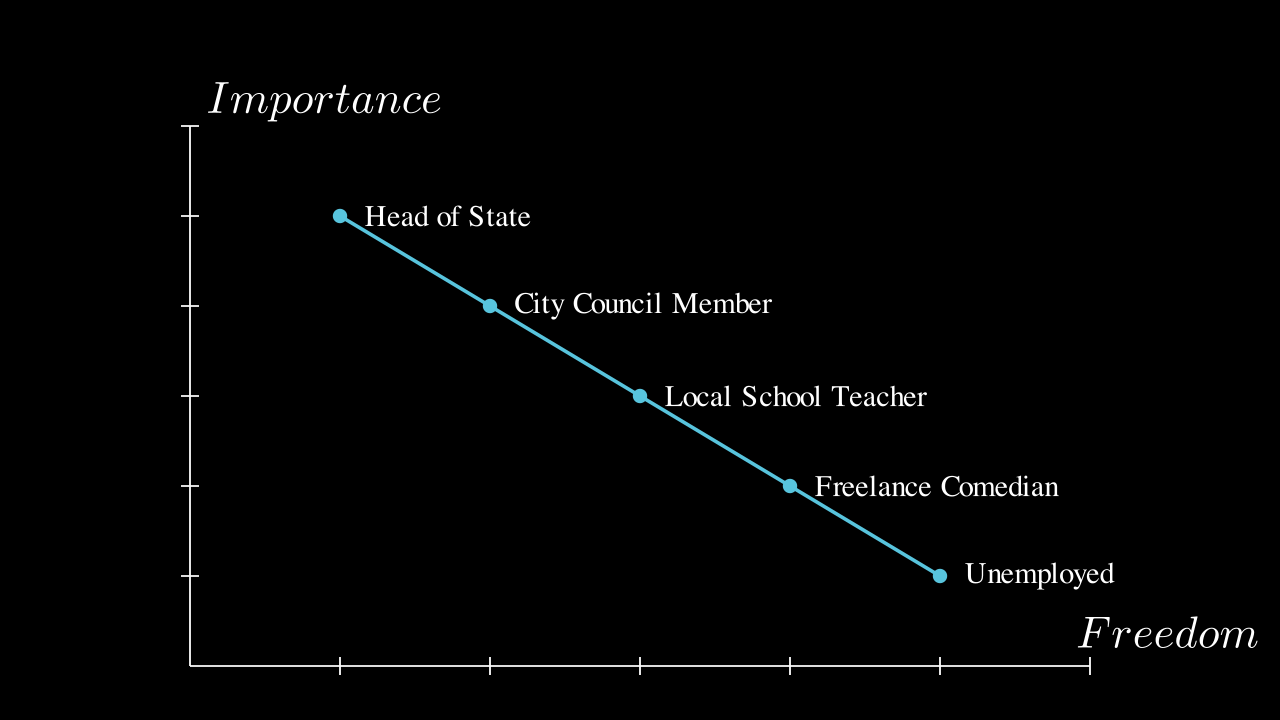Irreconcilable tradeoffs

One of my favourite mental models is: You can have anything you want but not everything you want.
I used to think that it would be possible, with enough money or power to overcome every constraint of life. One of the difficult to accept and indispensable truths of the world is that many good things lay at opposite ends of a spectrum that will not be bent or collapsed.
- You can’t be completely comfortable while experiencing personal growth or adventure
- You can’t be truly relaxed while working on something you really care about.
- You can’t be spontaneous and thoroughly planned and prepared.
- You can’t have total personal freedom and also have a centrally important role in your community.
What makes an irreconcilable trade-off
When you face what appears to be an irreconcilable trade-off apply this test: Does making the upside of A greater make the downside pull against B worse and vice-versa? If so it may be an irreconcilable trade-off.

When A being better makes B worse you may be in an irreconcilable tradeoff
Let's look at the tradeoff between total freedom and being an important member of your community.
The very nature of being important means people need your time - people needing your time is almost definitionally what makes you important. You can't have a radical level of freedom and be important - at least not in the moment.
Imagine how much freedom you would naturally have in a spectrum of roles ranging from little community importance to extreme importance:
- Unemployed with No Community Ties: Maximum freedom in terms of time and personal choices but minimal influence and societal responsibilities.
- Freelance Comedian: High degree of creative freedom and flexible schedule but with some community ties and client obligations.
- Local School Teacher: Some freedom in teaching methods and classroom management but structured by school policies and community involvement.
- City Council Member: Limited personal freedom due to public duties and constant community engagement, with considerable local influence.
- Head of State: Minimal personal freedom due to extensive responsibilities, public scrutiny, and national and international obligations, with maximum influence and societal importance.
Now imagine what might happen if you tried to be a head of state, or even a local school teacher, but with a radical view on the level of freedom and autonomy you desire. You can't just decide not to show up at work one day - people are counting on you.
The flip side of that burden is that the work you do matters to people every day.
Even for things that feel like they should be trade-off-able it’s never so easy
Here is a classic tradeoff wealthy families face: Live in the city and have walkability, density of restaurants, friends nearby — or live in the country and have abundant space and quiet.
A bright eyed ambitious person might say something like: “All you need is to have enough money to buy a _really huge_ city home” or “Easy, you buy one city home and one country home!”
Not so fast. The huge city home will never have the arboreal peace of a country estate. I’m also reminded of a story my friend relayed of visiting the secluded city-center penthouse roof deck - custom built by the owner to provide seclusion in the city - where the construction dust and cranes of the next door construction were a daily inconvenience.
Being close to others in the city has wonderful benefits - and some costs.
Many people do enjoy two homes - but even this is no panacea. First, you inexorably dilute the sense of “home” - you are slightly less integrated into both of your neighborhoods than you would be if you were a full time resident.
There’s the mental overhead of figuring out if you’ll be around on July 3rd when your friend asks if you want to bring your kids by for a play date. You’ll have doubled the amount of maintenance you need to track and complete, and doubled the number of things that can go wrong. You’ll spend time shuffling between locations and this is a time tax you can’t really get rid of.
The list goes on.
No doubt some smart readers will have some clever suggestions for how to ameliorate these issues - and no doubt some progress can be made but fundamentally living in two places is not the same “home” experience as living in one. This isn’t a diatribe against second homes - but rather a point that you can not simultaneously have the value of living in city and country at the same time without giving something up.
Dealing with tradeoffs
When dealing with these tradeoffs there are generally three strategies to choose from:
- Balance in the middle
- Pick one side and accept the trade-off
- Move between the sides over time
All of these are valid solutions - but I think that balance is the most overrated and moving between sides is the more underrated.
To grow muscle you must both exhaust the muscle and rest it. It it the sequencing and conjunction of these activities that produce the desired results.
For all of our most basic human desires: food, sex, sleep the desire is generally inversely correlated with the recency of the satiation of the desire.
After a large meal the thought of food is unappealing - but after a 24hr fast even simple food is tantalizing. It is therefore the not having that produces the wanting and the having that satisfies the wanting.
Even more fundamentally: You cannot rest if you’ve not exercised - and you cannot exercise if you’ve not rested.
This is one of the things I try to incorporate into Thinking in Eras: Where have I been before, where do I want to go next — and therefore what should I do now?




